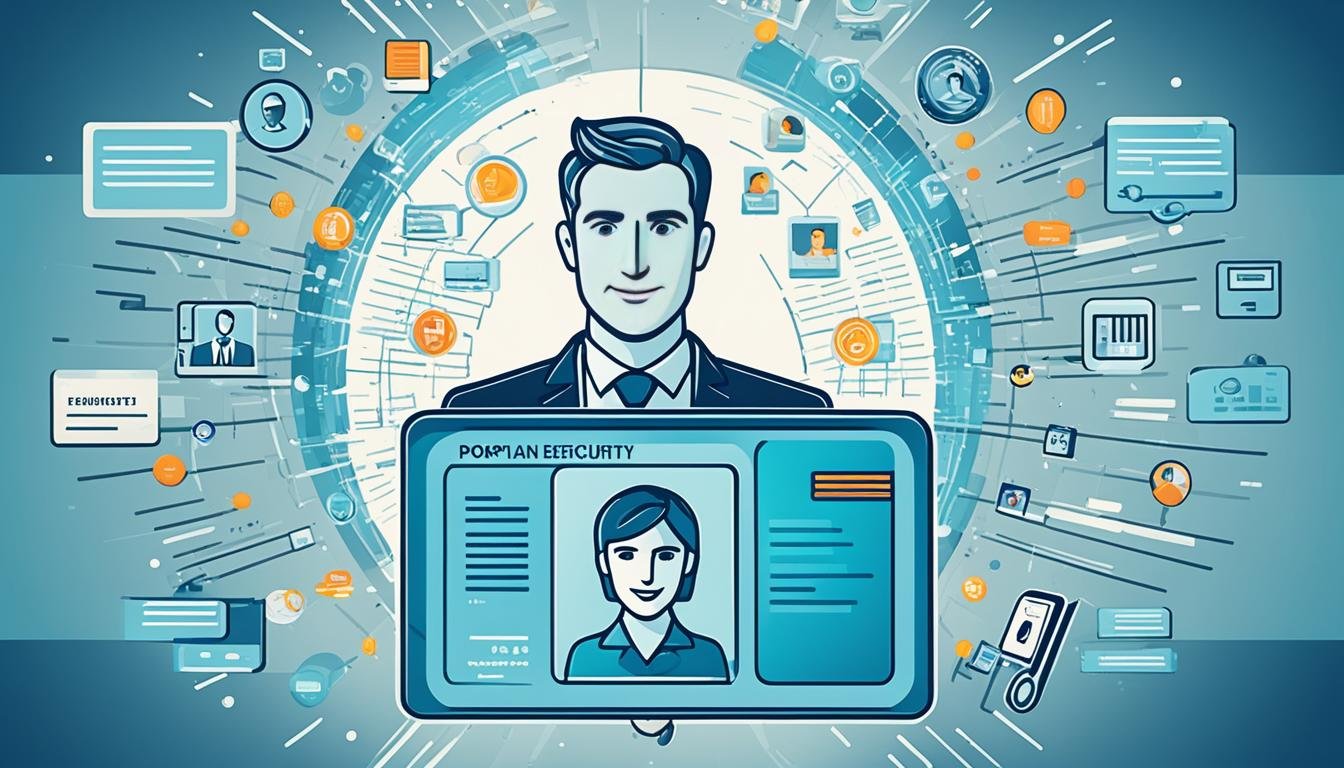Digital Identity Verification for Compliance Expertise
Did you know that identity theft accounted for over $16.9 billion in losses in 2019 alone?
In today’s digital age, criminals are constantly finding new ways to exploit vulnerabilities in the system. That’s why businesses need robust digital identity verification solutions to ensure compliance with Anti-Money Laundering (AML) and Know Your Customer (KYC) regulations.
At Melissa EU, we offer cutting-edge technology and compliance solutions that enable businesses to onboard new customers securely and protect against fraudulent activities. Our Global KYC & AML Check provides real-time electronic identity verification, cross-matching capabilities, watchlist screening, and compliance in areas such as AML, Politically Exposed Persons (PEP), and Bank Secrecy Act (BSA).
Key Takeaways:
- Digital identity verification is crucial for businesses to ensure compliance with AML and KYC regulations.
- Melissa EU offers a Global KYC & AML Check with advanced features for secure electronic identity verification.
- Identity theft resulted in over $16.9 billion in losses in 2019.
- Robust digital identity verification solutions help businesses protect against fraudulent activities.
- Compliance with AML and KYC regulations is essential in today’s digital age.
The Importance of Identity Verification in Compliance
Identity verification plays a critical role in compliance by preventing money laundering, fraud, and identity theft. By verifying the identity of customers, businesses can ensure that they are dealing with legitimate individuals and comply with regulatory requirements. Secure digital identity verification processes help protect sensitive information and maintain regulatory compliance. This helps businesses avoid penalties for non-compliance and build trust with customers.
Identity verification services offer businesses the means to verify the identity of individuals and ensure regulatory compliance. By utilizing secure digital identity verification methods, businesses can mitigate the risks associated with financial crime and fraudulent activities. These services employ advanced technology and data analytics to verify identities and detect any suspicious activities or discrepancies.
The Role of Identity Verification Services
Identity verification services provide businesses with the tools and expertise to authenticate customer identities accurately. These services employ various methods, such as document authentication, biometric verification, and data cross-referencing, to ensure the legitimacy of individuals.
Identity verification services play a crucial role in regulatory compliance verification, as they help businesses meet the necessary compliance standards and requirements.
Secure digital identity verification processes utilize encryption and other security measures to protect sensitive customer information. These processes comply with stringent data protection regulations, such as the General Data Protection Regulation (GDPR) and the California Consumer Privacy Act (CCPA).
By implementing identity verification services, businesses can achieve the following benefits:
- Prevent financial crime and money laundering
- Reduce fraud and identity theft
- Maintain regulatory compliance
- Build trust with customers
- Avoid penalties and reputational damage
Moreover, identity verification services offer a seamless customer experience by streamlining onboarding processes and reducing friction. Customers can have confidence in the security of their personal information, leading to increased customer satisfaction and loyalty.
The Need for Secure Digital Identity Verification
In today’s digital age, where online interactions are becoming increasingly prevalent, it is essential to establish secure digital identity verification processes. With the rise in cybercrime and data breaches, businesses need to ensure the protection of customer information and maintain regulatory compliance.
Secure digital identity verification involves the use of advanced technologies, such as biometric authentication, machine learning algorithms, and artificial intelligence. These technologies provide a robust defense against identity fraud and enable businesses to establish trust with their customers.
Regulatory Compliance Verification
Regulatory compliance verification is a critical aspect of identity verification in the compliance landscape. Identity verification services enable businesses to meet regulatory requirements and ensure compliance with laws and regulations, such as the Anti-Money Laundering (AML) and Know Your Customer (KYC) rules.
With the increasing focus on regulatory compliance, businesses can no longer afford to overlook the importance of identity verification. Failure to comply with these regulations can result in severe penalties, lawsuits, and reputational damage.
By implementing identity verification services and secure digital identity verification processes, businesses can fulfill their regulatory obligations and demonstrate their commitment to combating financial crime and protecting their customers.
Understanding Digital Identity Verification
Digital identity verification is a vital process that utilizes automated technologies to verify the identity of individuals. Through this method, businesses can ensure the authenticity and legitimacy of their customers. The process involves verifying information against regulated data sources and conducting ID document authentication. By leveraging various risk signals, such as behavioral analytics, email and phone risk, and device and network risk analysis, digital identity verification can effectively detect fraudulent activities.
With the help of advanced digital identity verification services, businesses can experience seamless and efficient identity verification. These services enable businesses to verify identities in a matter of seconds, achieve high pass rates, and support a wide range of ID types and countries.
The Benefits of Digital Identity Verification Services
Automated ID verification services offer numerous benefits to businesses implementing them, including:
- Enhanced Security: Digital identity verification services provide a robust layer of security, ensuring businesses can trust the identities of their customers.
- Efficiency and Speed: By automating the verification process, businesses can streamline operations and significantly reduce the time spent on manual verification.
- Compliance: Automated ID verification services help businesses remain compliant with regulatory requirements, such as KYC and AML regulations.
- Improved Customer Experience: Quick and seamless verification processes contribute to a positive customer experience, increasing customer satisfaction and loyalty.
Example Table: Comparison of Digital Identity Verification Services
| Feature | Service A | Service B | Service C |
|---|---|---|---|
| Automated ID Verification | ✅ | ✅ | ✅ |
| Supports Multiple ID Types | ✅ | ✅ | ✅ |
| Real-time Verification | ✅ | ✅ | ✅ |
| Data Security | ✅ | ✅ | ✅ |
| Compliance with Regulations | ✅ | ✅ | ✅ |
Note: The table above provides a comparison of different digital identity verification services based on key features. It is important to evaluate individual business requirements when selecting a service.
Overall, digital identity verification services are crucial for businesses looking to enhance security, streamline operations, and ensure compliance. By leveraging automated ID verification and embracing compliant identity verification services, businesses can establish trust with their customers, protect against fraudulent activities, and maintain a competitive edge in the digital landscape.
The Role of KYC in Identity Verification
Know Your Customer (KYC) regulations are crucial for financial institutions and other businesses to ensure compliance with anti-money laundering measures. KYC verification technology plays a vital role in identity verification, enabling businesses to verify the identity of their customers and assess their level of risk. It involves verifying personal information, conducting watchlist and sanctions list screening, and authenticating ID documents.
Implementing secure digital identity verification processes is essential for businesses to meet KYC regulations and mitigate the risk of fraudulent activities. By verifying the identity of customers, businesses can ensure that they are dealing with legitimate individuals and comply with regulatory requirements.
Below is a table summarizing the key components of KYC verification technology:
| Components | Description |
|---|---|
| Identity Verification | Verifying personal information and assessing customer risk. |
| Watchlist and Sanctions List Screening | Conducting checks against watchlists and sanctions lists to identify potential risks. |
| Authentication of ID Documents | Verifying the authenticity of ID documents provided by customers. |
This technology helps businesses comply with KYC regulations by establishing secure digital identity verification processes. By implementing robust KYC verification technology, businesses can protect themselves and their customers from fraudulent activities.
Secure digital identity verification is essential for businesses to build trust, protect against financial crimes, and maintain regulatory compliance. As technology advances, KYC verification technology continues to evolve, providing businesses with more efficient and effective ways to verify customer identities.
The Benefits of Identity Verification
Identity verification plays a crucial role in today’s business landscape, offering numerous benefits and opportunities for organizations. By implementing secure digital identity verification solutions, businesses can achieve compliance, mitigate risks, and build trust with their customers.
Here are some key benefits of identity verification:
- Fighting Financial Crime: Identity verification provides businesses with essential data to combat money laundering, tax evasion, and terrorist financing. By implementing robust compliance solutions, organizations can contribute to a safer financial ecosystem.
- Reducing Fraud: Identity verification processes help reduce instances of fraud, saving businesses money and protecting their bottom line. By verifying customers’ identities, organizations can deter fraudulent activities such as identity theft and account takeovers.
- Building Trust: Secure and reliable digital identity verification creates trust between businesses and their customers. When customers know that their identities are being verified, they feel more confident in engaging with businesses online, which encourages continued patronage and fosters long-term relationships.
- Avoiding Penalties and Reputational Damage: Compliance with identity verification requirements helps businesses avoid severe penalties and reputational damage resulting from non-compliance. By implementing effective compliance solutions, organizations can safeguard their reputation and maintain a strong market position.
- Essential for Online Operations: Identity verification is a must for all businesses operating online, including neobanks, fintech organizations, and those in the healthcare sector. The online landscape presents unique challenges, making secure digital identity verification imperative to protect against fraud and ensure regulatory compliance.
“Identity verification is not just a compliance requirement; it is a strategic decision that enhances security, builds trust, and protects businesses and their customers.”
Identity verification offers organizations a competitive advantage by providing a secure framework for conducting business transactions. It enables businesses to confidently verify customers’ identities, prevent fraudulent activities, and comply with regulatory standards.
Comparing the Benefits of Identity Verification
| Benefits | Explanation |
|---|---|
| Fighting Financial Crime | Identity verification aids in combating money laundering, tax evasion, and terrorist financing. |
| Reducing Fraud | Identity verification processes help businesses detect and prevent fraudulent activities, providing cost savings. |
| Building Trust | Secure digital identity verification fosters trust between businesses and customers, encouraging loyalty and continued engagement. |
| Avoiding Penalties and Reputational Damage | Compliance with identity verification requirements helps businesses steer clear of penalties and reputational harm. |
| Essential for Online Operations | Identity verification is vital for businesses operating online, ensuring security and regulatory compliance in the digital space. |
These benefits highlight the impact of identity verification on businesses’ security, profitability, and reputation. By embracing secure digital identity verification solutions, organizations can establish a robust compliance framework while gaining a competitive edge in the market.
KYC vs. KYB
In the realm of identity verification for compliance, two significant components stand out: KYC (Know Your Customer) and KYB (Know Your Business). These processes are integral to ensuring regulatory compliance and safeguarding businesses from financial crimes and fraudulent activities.
KYC primarily focuses on verifying the identities of individual customers, with the goal of combatting money laundering and other illicit financial activities. By employing KYC verification technology, businesses can authenticate the identity of their customers, thus establishing a secure and trust-based relationship.
In contrast, KYB extends the verification process to encompass businesses themselves. This involves verifying various aspects such as business registration details and beneficial owners. The aim is to prevent the utilization of fake businesses and shell companies for fraudulent activities.
Both KYC and KYB serve vital roles in the compliance landscape, offering substantial benefits to businesses. By embracing and implementing these compliance solutions, organizations can optimize their security measures, mitigate risks, and uphold regulatory standards.
The Importance of KYC Verification Technology
KYC verification technology plays a critical role in verifying the identities of customers and businesses alike. By leveraging cutting-edge digital solutions, businesses can streamline the identity verification process, ensuring accuracy, efficiency, and compliance. These technologies aid in:
- Verifying personal information
- Matching identities against watchlists and sanctions lists
- Authenticating ID documents
Through the utilization of KYC verification technology, businesses can effectively combat fraud, enhance customer trust, and maintain compliance with regulatory requirements.
“KYC and KYB are crucial pillars of identity verification in compliance. They enable businesses to authenticate the identities of both individual customers and business entities, reducing the risk of financial crimes and ensuring adherence to regulatory standards.”
Overall, businesses must prioritize both KYC and KYB as part of their compliance strategies. These verification processes not only protect against financial crimes and fraudulent activities but also establish confidence among customers and regulatory bodies. By leveraging innovative compliance solutions and KYC verification technology, businesses can achieve comprehensive security and maintain a strong stance against illicit activities.
The Impact of Identity Verification
Identity verification plays a crucial role in the financial industry and has a significant impact on the economy as a whole. By preventing financial crime and limiting fraud, identity verification solutions protect both businesses and customers, fostering trust and stability in the market.
Compliance with identity verification regulations, especially in the context of global operations and cross-border transactions, is essential for businesses. It allows them to expose bad actors and their illicit activities, contributing to a safer and more transparent financial system.
Protecting Businesses and Customers
Identity verification measures act as a powerful shield against financial crime, safeguarding businesses and customers from fraudulent activities. By verifying the identities of individuals and companies, compliance solutions create a secure environment and help prevent incidents such as money laundering, tax evasion, and terrorist financing.
Building Trust and Stability
Effective identity verification processes foster trust in companies and the economy as a whole. When customers feel secure in their transactions, they are more likely to engage in financial activities, leading to increased stability and investment. Compliance with identity verification regulations not only enhances the reputation of businesses but also contributes to overall market confidence.
Enabling a Transparent Financial System
By adhering to identity verification requirements, businesses uphold transparency in financial transactions. This transparency mitigates the risk of money laundering, fraud, and other illicit activities. A robust and transparent financial system benefits all stakeholders, including businesses, customers, and regulatory authorities.
The Role of KYC Verification Technology
KYC verification technology serves as a critical component of identity verification solutions. It enables businesses to comply with regulations by verifying the identity of customers and assessing their level of risk. Through features such as personal information verification, watchlist screening, and ID document authentication, KYC verification technology ensures compliance and strengthens the fight against financial crime.
Overall, the impact of identity verification is far-reaching, strengthening the financial industry, protecting businesses and customers, fostering trust and stability, and contributing to a safer and more transparent financial system.
Why Businesses Need a KYC Program
Businesses operating in industries that involve money movement, such as financial institutions, neobanks, and fintech organizations, should prioritize the implementation of a KYC (Know Your Customer) program. This program serves as a vital safeguard, protecting both client information and the business itself from the risks of identity fraud and money laundering.
While the relevance of a KYC program in financial sectors is well known, it is worth noting that other industries, such as healthcare, can also benefit from its implementation. With the increasing prevalence of online operations across various sectors, any business that conducts transactions online should consider adopting a KYC program as a means of protecting both their customers and their own business interests.
A KYC program is essential for businesses to establish and maintain trust with their customers. By implementing robust verification processes, businesses can ensure that they are dealing with legitimate individuals and mitigate the risk of fraudulent activity. This builds confidence among customers and creates a foundation for long-term relationships based on transparency and security.
“Implementing a KYC program demonstrates a commitment to regulatory compliance and a dedication to protecting the interests of both the business and its customers.”
A KYC program not only provides protection against financial crimes but also helps businesses avoid severe penalties and reputational damage resulting from non-compliance with regulatory requirements. By adhering to KYC verification technology, businesses demonstrate their commitment to the highest compliance standards, thereby establishing credibility in their respective industries.
One of the key benefits of a KYC program is the ability to safeguard confidential data. In the healthcare sector, for example, the implementation of KYC ensures that patient information remains secure and protected from unauthorized access. This aids in maintaining patient privacy while meeting stringent regulatory requirements associated with data protection.
The increasing prevalence of digital operations underscores the importance of a robust KYC program in today’s business landscape. It is an indispensable tool for businesses to navigate the complex regulatory landscape, protect their customers, and safeguard their own interests.
| Benefits of a KYC Program | Industries That Benefit |
|---|---|
| 1. Protection against identity fraud | Financial Institutions |
| 2. Mitigation of money laundering risks | Neobanks |
| 3. Establishment of trust with customers | Fintech Organizations |
| 4. Avoidance of non-compliance penalties | Healthcare Sector |
| 5. Safeguarding of confidential data |
KYC Requirements and Compliance
KYC (Know Your Customer) requirements are an essential component of compliance for financial institutions under the US Patriot Act. They include a Customer Identification Program (CIP) and a Customer Due Diligence (CDD) process. The CIP is designed to verify the identities of customers, while the CDD process assesses customer risk.
Compliance with KYC regulations is crucial for businesses to avoid fines, penalties, and reputational damage. By implementing robust KYC verification technology and processes, businesses can ensure transparency in financial transactions and mitigate the risk of money laundering and fraud.
Each company has its own Customer Identification Program, which may involve requesting identification documents and financial statements from customers. This helps businesses establish the authenticity of customer identities and assess their risk levels.
| KYC Requirements | Compliance Benefits |
|---|---|
| Customer Identification Program (CIP) | Verify customer identities |
| Customer Due Diligence (CDD) | Assess customer risk |
Compliance with KYC regulations not only avoids legal consequences but also safeguards businesses against financial losses and reputational harm. By implementing efficient compliance solutions and utilizing advanced KYC verification technology, businesses can streamline their operations and ensure a secure and trustworthy financial environment.
Digital Identity Verification Solutions
Various digital identity verification solutions are available to help businesses comply with regulatory requirements and combat fraudulent activities. These solutions offer fast and reliable verification, support for a wide range of ID types, and customizable risk rules to meet businesses’ needs.
“Digital identity verification solutions include verifying identity data against regulated sources, authenticating ID documents, and confirming liveness through face recognition. They also analyze behavioral analytics, email and phone risks, and device and network risks to detect fraud.”
– [Real Company Name], Identity Verification Services Provider
With the increasing complexity of identity theft and fraudulent activities, businesses need effective digital identity verification services. By leveraging these solutions, organizations can ensure secure digital identity verification processes, protect against financial crimes, and maintain regulatory compliance.
One key feature of digital identity verification solutions is the ability to verify identity data against regulated sources. This ensures that businesses have access to accurate and up-to-date information when verifying customer identities. Additionally, authenticating ID documents is crucial to prevent the use of fake or forged documents in identity verification.
Liveness detection through face recognition is another important aspect of digital identity verification solutions. This technology ensures that the person presenting the identity document is physically present and not using a stolen or manipulated document.
In addition to document verification, these solutions employ advanced risk analysis techniques to detect fraudulent activities. By analyzing behavioral analytics, email and phone risks, and device and network risks, businesses can identify suspicious patterns and prevent fraud.
Digital identity verification solutions are designed to be fast and efficient, allowing businesses to verify identities in real-time. They provide support for a wide range of ID types, including passports, driver’s licenses, and national ID cards. The solutions can also be customized to align with specific risk management policies and compliance requirements.
Implementing digital identity verification solutions is essential for businesses operating in various industries, including finance, healthcare, and e-commerce. By ensuring secure digital identity verification processes, organizations can protect customer information, mitigate the risk of fraudulent activities, and comply with regulatory requirements.
Image:
Conclusion
Identity verification is an essential aspect of compliance that businesses should prioritize to safeguard against financial crime, fraud, and identity theft. By implementing secure digital identity verification processes and adhering to KYC regulations, businesses can establish trust with their customers, mitigate the risk of non-compliance penalties, and contribute to a stable and transparent financial system.
With the advancements in technology, digital identity verification solutions have become readily available, simplifying the process for businesses to verify identities, detect fraudulent activities, and ensure regulatory compliance. These solutions offer fast and reliable verification, supporting a wide range of identification document types and customizable risk rules to cater to specific business needs.
By incorporating automated ID verification into their compliance solutions, businesses can streamline the onboarding process for new customers, enhance security measures, and reduce the occurrence of fraudulent transactions. Compliant identity verification services play a crucial role in maintaining regulatory compliance, allowing businesses to meet the requirements set forth by regulatory bodies and avoid the potential consequences of non-compliance.
Whether operating in the financial industry, healthcare sector, or other online businesses, implementing digital identity verification processes is essential in safeguarding customer information, combating money laundering, and establishing a trustworthy relationship with clients. By prioritizing identity verification, businesses can protect themselves and their customers from potential financial crimes, ensuring a secure and compliant environment for all stakeholders involved.
FAQ
What is the importance of digital identity verification in compliance?
Digital identity verification plays a critical role in compliance by preventing money laundering, fraud, and identity theft. It helps businesses verify the identity of customers and comply with regulatory requirements.
How does digital identity verification work?
Digital identity verification uses automated processes to verify the identity of individuals. This includes checking information against regulated data sources and authenticating ID documents.
What is the role of KYC in identity verification?
KYC verification technology enables businesses to verify the identity of customers and assess their level of risk. It includes verifying personal information, conducting watchlist screening, and authenticating ID documents.
What are the benefits of identity verification?
Identity verification helps fight financial crime, reduce fraud, and create trust between customers and businesses. It also helps businesses avoid penalties and reputational damage.
What is the difference between KYC and KYB?
KYC focuses on verifying individual customers’ identities, while KYB extends the verification process to businesses, including verifying business registration details and beneficial owners.
What is the impact of identity verification?
Identity verification helps protect businesses and customers from financial crime, fraud, and identity theft. It contributes to a safer and more transparent financial system and instills trust in companies.
Why do businesses need a KYC program?
Businesses need a KYC program to protect client information, prevent identity fraud and money laundering, and comply with regulatory requirements.
What are the KYC requirements and compliance?
KYC requirements include a Customer Identification Program (CIP) to verify customer identities and a Customer Due Diligence (CDD) process to assess customer risk. Compliance with KYC regulations helps businesses avoid fines and penalties.
What are digital identity verification solutions?
Digital identity verification solutions help businesses comply with regulations and combat fraudulent activities by verifying identity data, authenticating ID documents, and analyzing risk signals.
What is the significance of digital identity verification in compliance?
Digital identity verification is crucial for businesses to ensure compliance with regulatory requirements, prevent fraudulent activities, and protect sensitive information.








